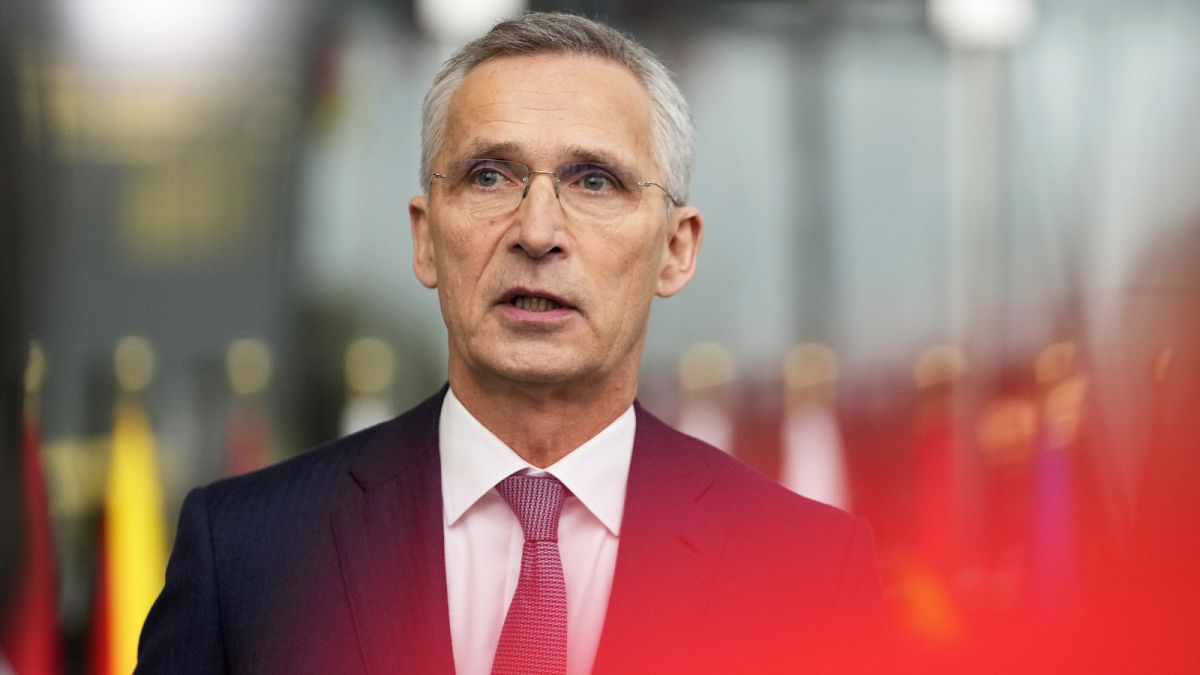Politics
Signatures submitted in bid to bring California-style 'Top 2' primaries to South Dakota
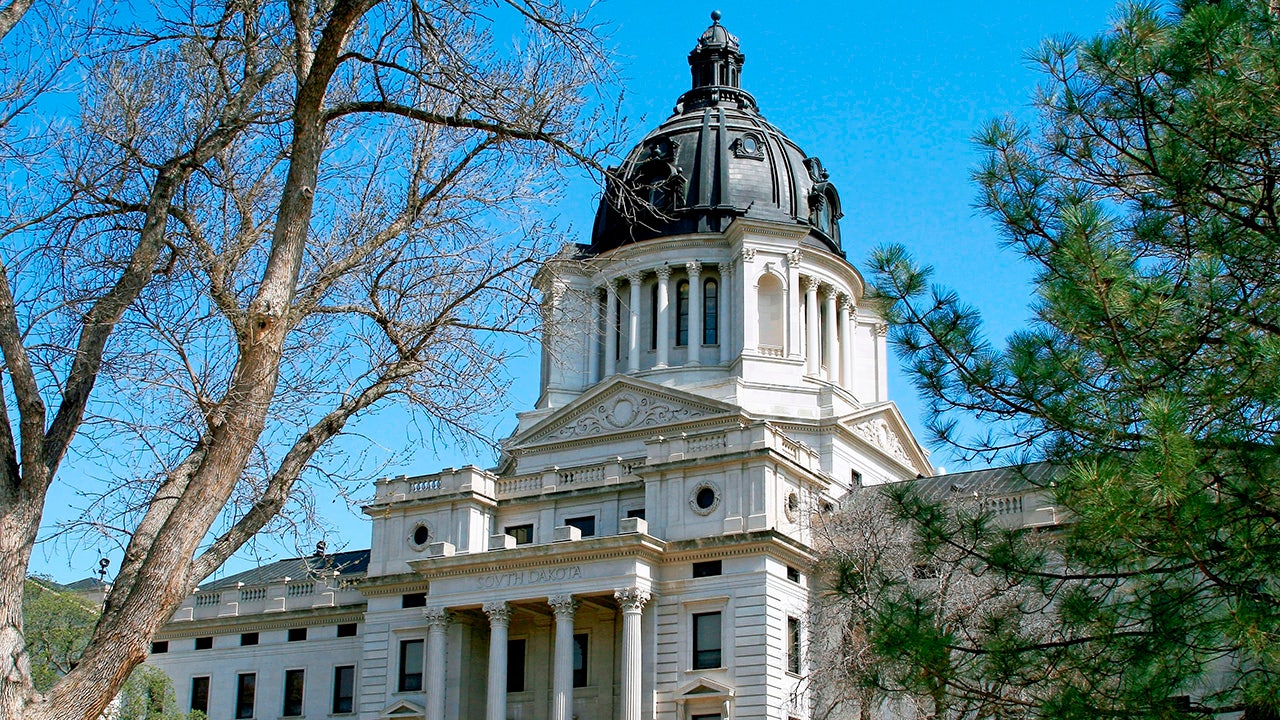
- Thousands more signatures than required were submitted in favor of a “top two” primary system in South Dakota.
- Under the proposed system — already implemented in states like California and Washington — candidates from all parties would appear on a single, nonpartisan ballot, and the top two would advance to the general election regardless of affiliation.
- Deanna “De” Knudson, a registered Republican sponsoring the measure, stated her belief that the current nomination system “excludes about half of the voters from the real race, and we just really believe that this is a fairness issue.”
Supporters of a “top two” primary election system in South Dakota that would replace the current partisan process with one open to all voters have submitted thousands more petition signatures than required to bring a vote this fall on their ballot initiative.
On Monday, South Dakota Open Primaries sponsors said they submitted petitions with 47,000 signatures to Secretary of State Monae Johnson’s office. The measure group needs 35,017 valid signatures to make the November ballot. Johnson’s office has until Aug. 13 to validate the measure, a proposed constitutional amendment.
Under South Dakota’s current primary election system, candidates in gubernatorial, congressional, legislative and county races compete in a partisan primary. The measure would allow all candidates to compete against each other in one primary, and the top two vote-getters in each race or for each seat would advance to the general election. A similar measure failed in 2016.
NOEM ADDRESSES FEELING ‘THREATENED’ BY NIKKI HALEY, A CONTROVERSIAL DOG KILLING, TRUMP VP SPECULATION IN BOOK
Other states such as California and Washington have “top two” primary elections similar to the measure proposed in South Dakota.
Measure sponsor Deanna “De” Knudson, a registered Republican, said she doesn’t think the state has a fair system, in that it “excludes about half of the voters from the real race, and we just really believe that this is a fairness issue.”
The South Dakota State Capitol is photographed in Pierre, South Dakota. (Education Images/Universal Images Group via Getty Images)
Republicans control South Dakota’s Legislature and hold all statewide elected offices and congressional seats. Democrats haven’t won a statewide election since 2008, when former U.S. Sen. Tim Johnson and U.S. Rep. Stephanie Herseth Sandlin won reelection to their last terms.
South Dakota has nearly 602,000 registered voters, including 304,000 Republicans and 144,000 Democrats, but people registered as “no party affiliation” or “independent” total nearly 150,000 voters, according to online voter registration tracking.
State Republican Party Chairman and state Sen. John Wiik said he vehemently opposes the measure. He said he sees “no good coming out of it for the Republican Party.” The state GOP’s central committee unanimously opposed the measure, he said.
“I want Republicans to be able to choose the Republican candidate, and Democrats to choose the Democrat candidate,” Wiik said. “If you want to be an independent, then you’re independent of the decisions that affect your lives.”
Knudson said the measure would bring a much more competitive process and “will make sure that the winning candidate is the one most South Dakotans agree on.” She questioned the balance of power in the Legislature, where Democrats hold 11 of 105 seats, and whether that is truly reflective of voters’ will.
State Democratic Party Executive Director Dan Ahlers said the party hasn’t taken a stance on the measure. The Democratic Party allows “no party affiliation” and independent voters to vote in its primary, along with registered Democrats.

Politics
Trump tells NY donors he'll stop college 'radical revolution,' send anti-Israel agitators 'out of the country'
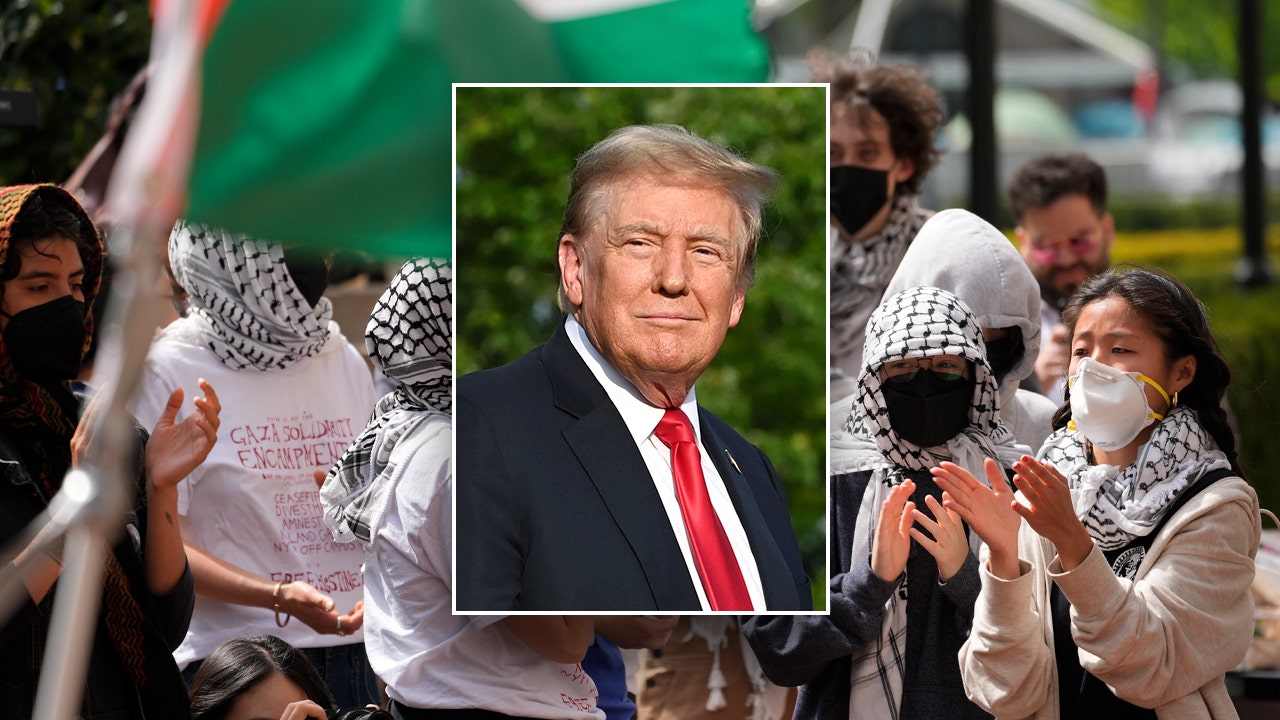
Former President Trump reportedly told a private gathering of New York donors earlier this month that he will stop the “radical revolution” happening at American college campuses if elected president again.
The presumptive Republican nominee also vowed that he would throw foreign students protesting against Israel “out of the country,” The Washington Post reported on Tuesday, citing donors who spoke on condition of anonymity. The gathering happened on May 14 and included “98 percent of my Jewish friends,” Trump reportedly joked.
“One thing I do is, any student that protests, I throw them out of the country. You know, there are a lot of foreign students. As soon as they hear that, they’re going to behave,” Trump said, according to the Post.
When the donors expressed concern that anti-Israel students and professors would one day hold positions of power in the U.S., Trump reportedly said they were part of a “radical revolution.”
ISRAEL-HAMAS WAR WOULD ‘PROBABLY ALREADY BEEN OVER’ IF TRUMP WERE PRESIDENT, SEN. TOM COTTON SAYS
Former President Donald Trump on May 23, 2024, in the Bronx, New York City. (Andrea Renault/Star Max/GC Images)
“It has to be stopped now,” Trump said of the protests, praising the New York Police Department’s handling of the encampment at Columbia University, adding that other cities should follow suit.
“Well, if you get me elected, and you should really be doing this, if you get me reelected, we’re going to set that movement back 25 or 30 years,” he said, according to the donors who spoke to the Post.
Trump also reportedly told the wealthy New York donors at the closed-door event that he supports Israel’s right to continue “its war on terror” and praised his White House’s policies on Israel.
Trump did not, however, mention Israeli Prime Minister Benjamin Netanyahu by name. He reportedly hasn’t spoken to Netanyahu in years since the Israeli prime minister recognized President Biden’s 2020 victory.
The presumptive Republican presidential nominee has faced pressure from GOP donors in recent months to take a stronger stance in support of Israel and specifically, Netanyahu.
In April, Trump notably said during an interview with conservative talk show radio host Hugh Hewitt that Israel, regarding its war in Gaza, needs to “get it over with, and let’s get back to peace and stop killing people.”
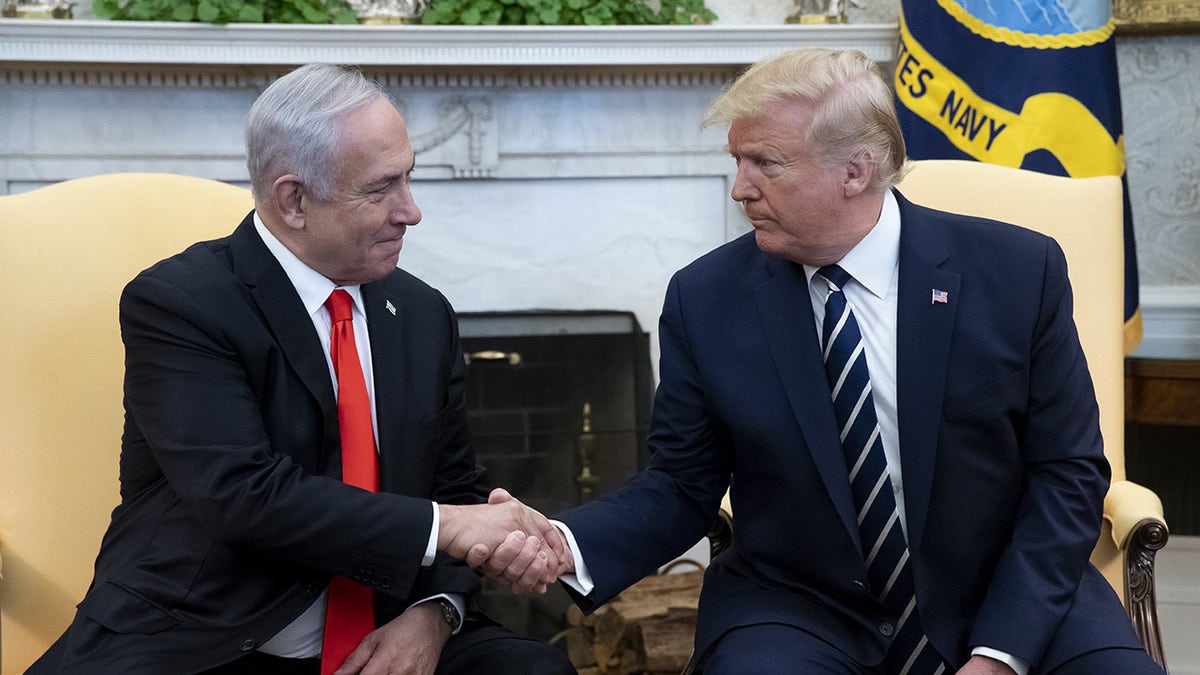
President Donald Trump shakes hands with Israeli Prime Minister Benjamin Netanyahu during a meeting in the Oval Office on Monday, Jan. 27, 2020. (Michael Reynolds/EPA/Bloomberg via Getty Images)
NETANYAHU RESPONDS TO STRIKE THAT KILLED HAMAS TERROR LEADERS, CIVILIANS: ‘INVESTIGATING THE INCIDENT’
Asked about the donors’ description of the New York event, the Trump campaign’s national press secretary, Karoline Leavitt, issued a broad statement to the Post.
“When President Trump is back in the Oval Office, Israel will once again be protected, Iran will go back to being broke, terrorists will be hunted down, and the bloodshed will end,” Leavitt said.
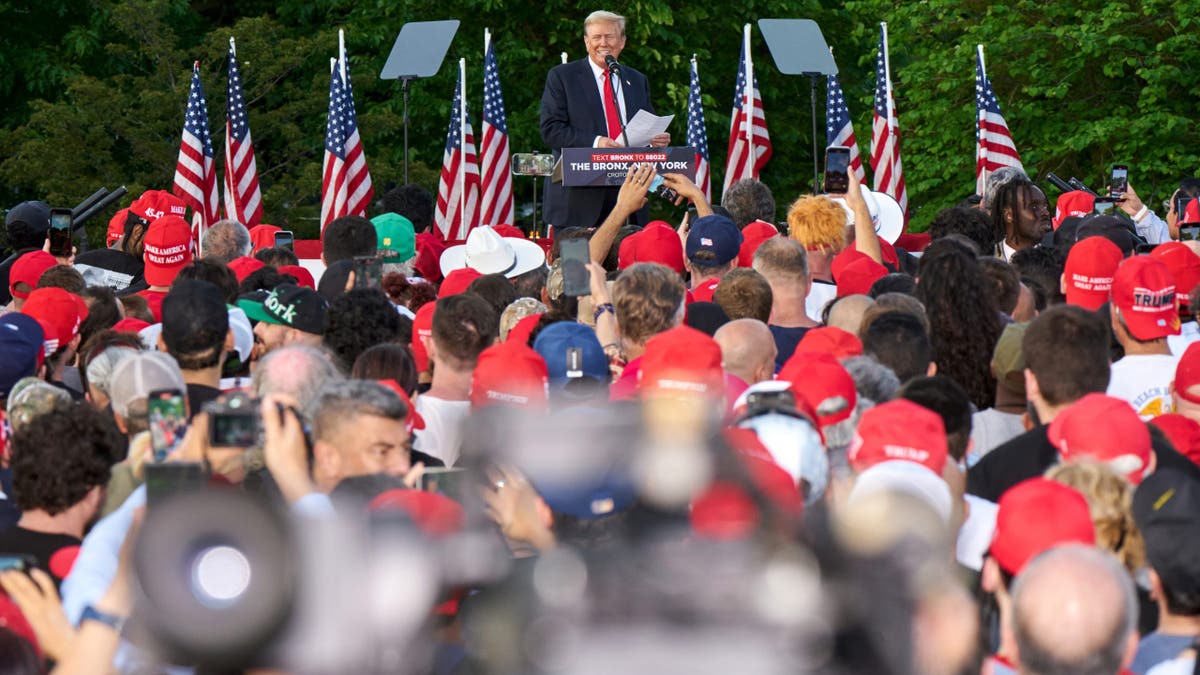
Former President Donald Trump, center, during a campaign event at Crotona Park in the Bronx, New York, on Thursday, May 23, 2024. (Bing Guan/Bloomberg via Getty Images)
While claiming anti-Israel demonstrations seen across the country get smaller crowds than his rallies, Trump said that “Israel is losing its power” in Washington, D.C., particularly in Congress.
`
“It’s incredible,” Trump added, questioning how Jewish people could vote for Democrats, specifically Biden.
“They always let you down,” he said.
Politics
Opinion: Why the push to legalize gambling on U.S. elections is so dangerous

Free and fair elections, the foundation of our democracy, face an unprecedented array of threats as the next one approaches. While some of these threats are well-known, others go largely unnoticed, with potentially serious consequences. Among the latter is a dangerous attempt to persuade one of our financial regulators to essentially authorize gambling on election results.
You might expect such a question to be answered by the Federal Election Commission, the agency with the expertise, history and authority to regulate elections. But a financial services company in fact petitioned an obscure financial regulatory agency to allow betting on elections through the commodities market, a prospect that could unleash a torrent of misinformation and harm investors for no discernible purpose.
The company, Kalshi, asked the Commodity Futures Trading Commission to approve public trading of a so-called event contract that would allow investors to gamble up to $100 million on which party wins control of the U.S. House and Senate in November. The commission rightly rejected the proposal last fall, but the saga is hardly over. In keeping with the financial industry’s standard playbook, the company has sued the financial regulator, hoping a court will overturn the agency’s experts and allow it to open a virtual election casino.
The stakes of the case, which is expected to be argued in federal court in Washington this week, are high. First and foremost, the ability to “win” tens or hundreds of millions of dollars gambling on elections would create powerful new incentives for bad actors to influence voters and manipulate the results to favor their bets. Artificial intelligence “deepfakes” and other technological tools for doing so are readily available, increasingly inexpensive and primed for distribution via social media.
Just a few months ago, AI robocalls impersonating President Biden targeted New Hampshire primary voters in an effort to suppress turnout. We will undoubtedly see more such tactics before November, and enabling huge financial investments in the outcome would only supercharge them, with potentially dire consequences for our democracy.
The idea of gambling on elections is not new. Ahead of the 2012 contest between President Obama and Mitt Romney, betting on the outcome through the Ireland-based Intrade site led many observers to believe the Republican challenger was favored to win. On closer examination, however, it turned out that a single bettor had wagered large sums of money to falsely prop up Romney.
Beyond the threat to democracy, election gambling has the potential to harm investors on a large scale. The rising prevalence of constant access to markets via game-like smartphone apps, advertising campaigns full of celebrity faces and deepfake misinformation will entice more Americans into risky bets. These technologies have the potential to generate speculative investment crazes that cost investors dearly, as we saw during the “meme stock” frenzy of 2021.
Increasing addiction to cryptocurrency trading and sports gambling shows the danger of expanding these kinds of activities. And the threat to investors would grow as betting options inevitably expand from congressional control to other federal, state and local races.
Election gambling contracts pose additional financial risks. Untethered to any fundamental values, these markets would be exceptionally easy to manipulate and hard to police, further endangering unwary investors. The information that determines the pricing of the contracts would be a hodgepodge of unregulated, opaque unscientific sources such as polls and media reports that vary widely in rigor and reliability. The “house” setting the odds and others bent on profit would likely be able to selectively compile, skew and deploy data to manipulate prices.
And all for what? These contracts would serve no useful purpose. The commodities markets, which were originally limited to trading futures contracts for traditional commodities such as crops, livestock and precious metals, have steadily grown to encompass more abstract “commodities” such as futures on stock market indices. Event contracts are the latest phase of this evolution, and while some of them serve a useful function in the markets, the political gambling contracts at issue in this case simply do not.
The contracts are not reliable tools for hedging against price fluctuations or pricing the essential goods that Americans rely on, which is what the commodities commission is supposed to regulate. As the smallest and least-funded U.S. financial regulatory agency, the commission should remain focused on policing the multitrillion-dollar commodities and derivatives markets, not attempting to oversee the electoral process.
For more than 200 years, the courts have emphatically and consistently warned of the unique societal harm that could come with corruption of the electoral process through gambling. Congress has also recognized the extraordinary danger posed by this idea, which is no doubt why it authorized the commodities commission to prohibit such contracts. The commission was right to say no, and for the sake of our democracy, the federal courts should too.
Dennis Kelleher is a co-founder and the president and chief executive of Better Markets. Lisa Gilbert is the executive vice president of Public Citizen.
Politics
Biden honors late son Beau in somber Memorial Day message: ‘The hurt is still real’
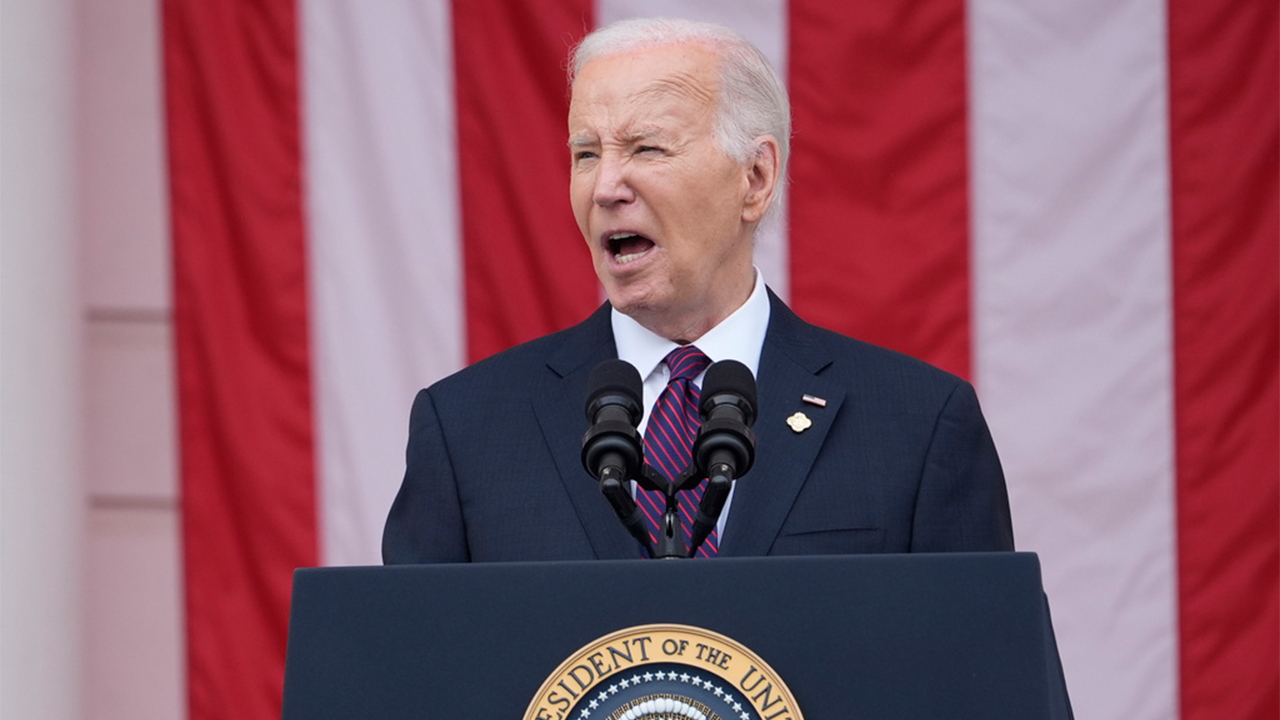
President Biden on Monday invoked the memory of his late son, Beau Biden, while addressing an audience at Arlington National Cemetery for a Memorial Day ceremony.
Sharing the pain of those whose family members have died in service, Biden noted this week marks nine years since he lost his son Beau, who served in Iraq and later died from brain cancer that the president attributes to his time stationed near toxic burn pits.
Still, the president was careful to draw a distinction between the loss of his son and those who lost loved ones on the battlefield.
President Joe Biden delivers the Memorial Day Address at the 156th National Memorial Day Observance at Arlington National Cemetery in Arlington, Va., Monday, May 27, 2024. (AP Photo/Susan Walsh)
“Our losses are not the same. He didn’t perish on the battlefield. He was a cancer victim from a consequence of being in the army in Iraq for a year next to a burn pit. A major of the U.S. National Army, National Guard, living and working, like too many, besides that toxic burn pit,” Biden said.
The president told the audience: “As it is for so many of you, the pain of his loss is with me every day as it is with you. Still sharp. Still clear. But so is the pride I feel in this service, as if I can still hear him saying, ‘It’s my duty, dad. It’s my duty. That was the code of my son. Live by the creed. All of you live by the creed.”
REPS. ILHAN OMAR, CORI BUSH MIX UP MEMORIAL DAY WITH VETERANS DAY IN SINCE-DELETED POSTS ON X
A major in the Delaware Army National Guard, Beau Biden died of brain cancer in 2015 at the Walter Reed military hospital in Bethesda, Maryland.
Reactions to Biden’s speech on X were mixed. One user described his speech as a “heart-wrenching display of empathy and understanding.” Others accused the president of making this “all about himself again.”
Biden has on numerous occasions claimed that his son died on the battlefield in Iraq, including while speaking to Marines stationed in Japan, and during a 2022 speech in Colorado.
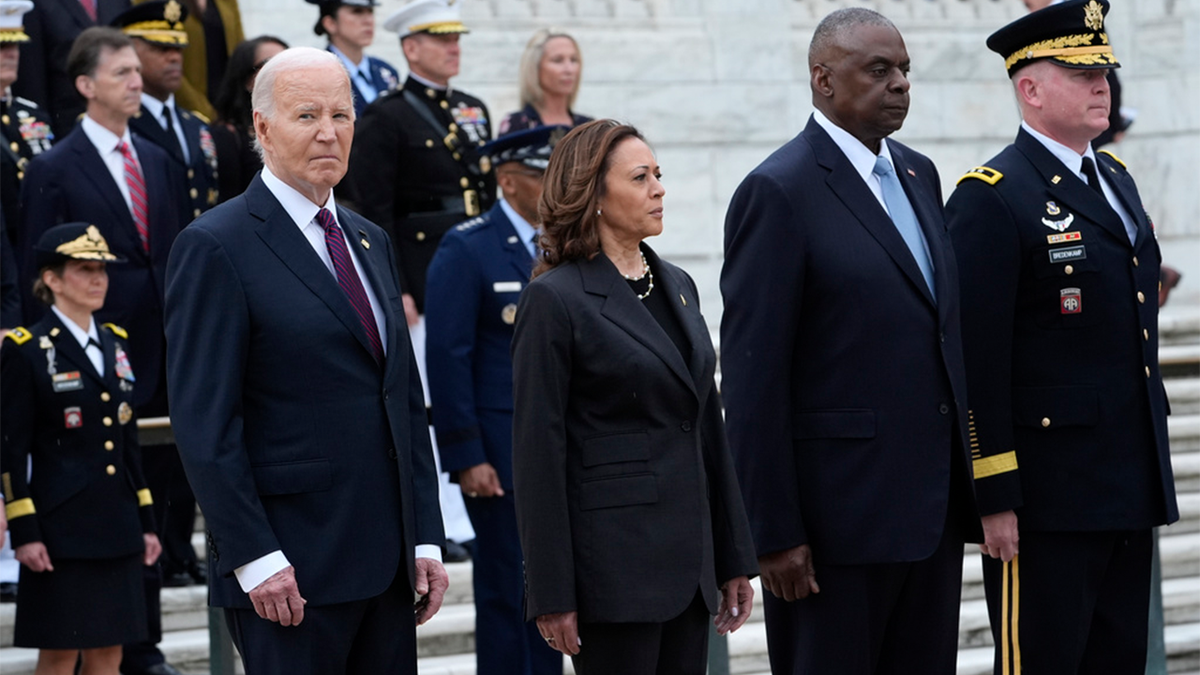
President Joe Biden, left, joined by, from left, Vice President Kamala Harris, Defense Secretary Lloyd Austin and Army Major Gen. Trevor Bradenkamp, pause during an Armed Forces Full Honors Wreath Ceremony at the Tomb of the Unknown Soldier at Arlington National Cemetery in Arlington, Va., on Memorial Day, Monday, May 27, 2024. (AP Photo/Susan Walsh) (AP Photo/Susan Walsh)
Biden began the day hosting a breakfast at the White House for administration officials, military leaders, veterans, and Gold Star family members. Joined by Vice President Kamala Harris and Defense Secretary Lloyd Austin, Biden placed a wreath at the Tomb of the Unknown Soldier before the ceremony began.
Biden touted the VA’s achievements last year for having delivered “more benefits and processed more claims than ever in our history.”
He credited the PACT Act, which grants automatic coverage for certain health conditions suffered by veterans exposed to toxic substances such as burn pits or Agent Orange.
“For too long after fighting for our nation, these veterans had to fight to get the right health care, to get the benefits they had earned, not anymore,” he said.
The Associated Press contributed to this report.
-

 Movie Reviews1 week ago
Movie Reviews1 week ago‘The Substance’ Review: An Excellent Demi Moore Helps Sustain Coralie Fargeat’s Stylish but Redundant Body Horror
-

 News1 week ago
News1 week agoVideo: A Student Protester Facing Disciplinary Action Has ‘No Regrets’
-

 Movie Reviews1 week ago
Movie Reviews1 week ago‘Rumours’ Review: Cate Blanchett and Alicia Vikander Play Clueless World Leaders in Guy Maddin’s Very Funny, Truly Silly Dark Comedy
-

 Movie Reviews1 week ago
Movie Reviews1 week ago‘Blue Sun Palace’ Review: An Intimate, Affecting and Dogma-Free Portrait of Chinese Immigrants in Working-Class New York
-

 Culture1 week ago
Culture1 week agoFrom Dairy Daddies to Trash Pandas: How branding creates fans for lower-league baseball teams
-

 World1 week ago
World1 week agoPanic in Bishkek: Why were Pakistani students attacked in Kyrgyzstan?
-

 World1 week ago
World1 week agoRussian court seizes two European banks’ assets amid Western sanctions
-

 Politics7 days ago
Politics7 days agoAnti-Israel agitators interrupt Blinken Senate testimony, hauled out by Capitol police











